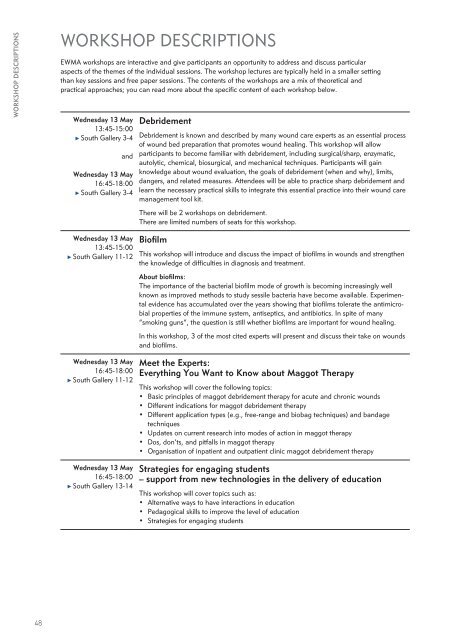Create successful ePaper yourself
Turn your PDF publications into a flip-book with our unique Google optimized e-Paper software.
WORKSHOP DESCRIPTIONS<br />
WORKSHOP DESCRIPTIONS<br />
EWMA workshops are interactive and give <strong>part</strong>icipants an opportunity to address and discuss <strong>part</strong>icular<br />
aspects of the themes of the individual sessions. The workshop lectures are typically held in a smaller setting<br />
than key sessions and free paper sessions. The contents of the workshops are a mix of theoretical and<br />
practical approaches; you can read more about the specific content of each workshop below.<br />
Wednesday 13 May<br />
13:45-15:00<br />
South Gallery 3-4<br />
and<br />
Wednesday 13 May<br />
16:45-18:00<br />
South Gallery 3-4<br />
Debridement<br />
Debridement is known and described by many wound care experts as an essential process<br />
of wound bed preparation that promotes wound healing. This workshop will allow<br />
<strong>part</strong>icipants to become familiar with debridement, including surgical/sharp, enzymatic,<br />
autolytic, chemical, biosurgical, and mechanical techniques. Participants will gain<br />
knowledge about wound evaluation, the goals of debridement (when and why), limits,<br />
dangers, and related measures. Attendees will be able to practice sharp debridement and<br />
learn the necessary practical skills to integrate this essential practice into their wound care<br />
management tool kit.<br />
There will be 2 workshops on debridement.<br />
There are limited numbers of seats for this workshop.<br />
Wednesday 13 May<br />
13:45-15:00<br />
South Gallery 11-12<br />
Wednesday 13 May<br />
16:45-18:00<br />
South Gallery 11-12<br />
Wednesday 13 May<br />
16:45-18:00<br />
South Gallery 13-14<br />
Biofilm<br />
This workshop will introduce and discuss the impact of biofilms in wounds and strengthen<br />
the knowledge of difficulties in diagnosis and treatment.<br />
About biofilms:<br />
The importance of the bacterial biofilm mode of growth is becoming increasingly well<br />
known as improved methods to study sessile bacteria have become available. Experimental<br />
evidence has accumulated over the years showing that biofilms tolerate the antimicrobial<br />
properties of the immune system, antiseptics, and antibiotics. In spite of many<br />
“smoking guns”, the question is still whether biofilms are important for wound healing.<br />
In this workshop, 3 of the most cited experts will present and discuss their take on wounds<br />
and biofilms.<br />
Meet the Experts:<br />
Everything You Want to Know about Maggot Therapy<br />
This workshop will cover the following topics:<br />
• Basic principles of maggot debridement therapy for acute and chronic wounds<br />
• Different indications for maggot debridement therapy<br />
• Different application types (e.g., free-range and biobag techniques) and bandage<br />
techniques<br />
• Updates on current research into modes of action in maggot therapy<br />
• Dos, don’ts, and pitfalls in maggot therapy<br />
• Organisation of inpatient and outpatient clinic maggot debridement therapy<br />
Strategies for engaging students<br />
– support from new technologies in the delivery of education<br />
This workshop will cover topics such as:<br />
• Alternative ways to have interactions in education<br />
• Pedagogical skills to improve the level of education<br />
• Strategies for engaging students<br />
48


